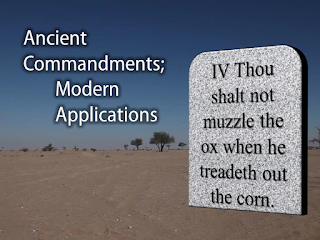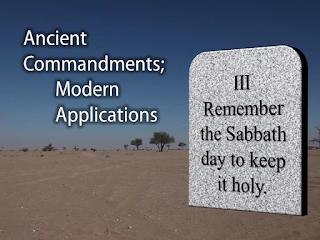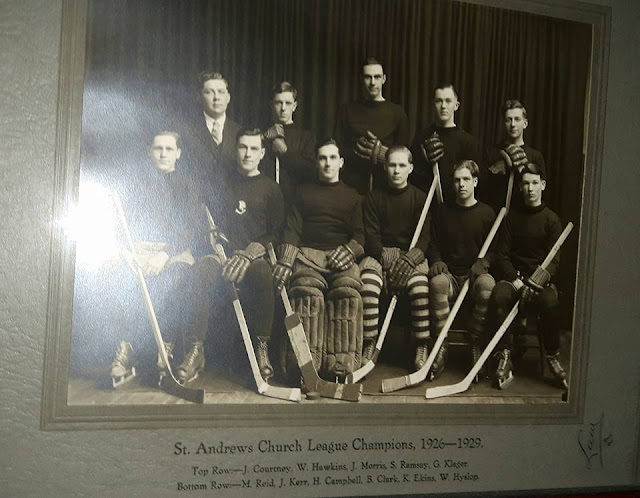Here is an introduction to our September series of sermons talking about important questions concerning church growth:
Why not invite other people but following this link. Then click "share"
IV Thou shalt not muzzle the ox when he treadeth out the corn
Hespeler, 28 August, 2016 © Scott McAndless
1 Corinthians 9:1-14, Deuteronomy 25:4, Psalm 8
| T |
he Bible, especially the Old Testament, is just chock full of rules, laws and commandments. They speak to every sort of situation and moral decision but, I’ve got to admit, I have always had a soft spot for those particular commandments that get very specific about the situation. The commandment that we read this morning about not muzzling your ox is a great example, but there is an even better one a few verses after that one.
The commandment goes like this: “If men get into a fight with one another, and the wife of one intervenes to rescue her husband from the grip of his opponent by reaching out and seizing his...” Okay, I just remembered why we don’t usually talk about this commandment. Let’s just say that she grabs him in a very specific place and leave it at that. But my point isn’t about where she grabs him. It is about how very specific the law is. It is so specific, in fact, that it seems extremely likely that this law was actually written in response to an actual incident. I mean, at some point there were two actual men fighting and the wife of one of them did some specific grabbing and someone was trying to figure out what the specific and reasonable punishment for that action was.
This particular commandment probably represents an actual judgement that was made in a particular case and it got recorded in the scriptures. (And, just for the record, I don’t find the judgement that is made to be particularly reasonable, as the woman ends up losing her hand, but that, also, is a whole other discussion.)
My question is this: what is the application of a very specific commandment like this? I mean, you are fine if the exact same situation arises in exactly the same way again; then you know what to do. But what if the circumstances aren’t exactly the same. What if three men are fighting instead of two? Do we need a whole different commandment to deal with that situation? And what if the woman doesn’t intentionally grab? What if she just brushes something accidentally? Is that a different case entirely? These are the sort of questions that you are often left with when you write you commandments that apply too specifically to certain situations.
And I think that these sorts of questions become more important when we turn from fighting men to the commandment that comes a few verses before it that we read this morning: “You shall not muzzle an ox while it is treading out the grain.” This is a very specific commandment, but the situation that it speaks to was one that the people who first heard this commandment ran into a lot. You see, most of them were farmers and most of them grew grains like wheat or barley. And when you harvest grain, there are three key steps. You first cut the grain. Then you thresh it by beating the grain with something hard to loosen the chaff that covers the kernel. Then you winnow it or separate the kernels from the chaff, often by throwing it all into the air so that the wind can blow the chaff away while the kernels fall back to the ground.
But sometimes, with certain grains, it could take an awful lot of force to break the chaff away and so one of the best ways to accomplish that was by getting a big, heavy animal with hard hooves (like an ox) to step on it. This was called treading out the grain and it was a very common way to thresh your grain at harvest time.
So what we have in this commandment is a very specific regulation regarding how you ought to treat your ox while it was treading out your grain because, of course, there was an immediate problem whenever you did that. Oxen eat grain. They love it. So it is only natural for your ox to start snacking away at your crop while you are making it tread out your grain. You can see why you might want to prevent that by muzzling your ox while it is treading but this commandment says no, you cannot do that.
And I have absolutely no problem with this commandment. It seems all very reasonable to me that, if you are making your ox work that hard to harvest your crop, why not let him steal a few bites of good food along the way? My only problem is that it is so very specific. What happens, for example, if you don’t have an ox and use another animal to tread your grain: a horse, a cow or a bull? The command only says ox, so can you muzzle those other animals?
And, of course, since modern farmers don’t use animals to tread their grain at all but instead use a machine called a combine, that does all the cutting, threshing and winnowing at once, you could certainly argue that there is no modern application of the commandment. This commandment would therefore have no meaning or application for us today at all.
So is that correct? If we no longer do the specific thing that the commandment is talking about, we can just forget it? Does it simply not apply anymore? We’ll I don’t believe so. Yes, the world has changed and changed a great deal since the Bible was first written, and, while we may no longer live in the same way that the people in the Bible did, I will always believe that there are principles in these very specific commandments that still apply today.
On a very simple level, I am sure we would all agree that there is a principle at stake in this commandment concerning muzzling oxen that we can take and apply today. To not muzzle an ox while it is treading is to think about the needs of that ox. It is a way of being kind and not being cruel. So I don’t think that it would be an unreasonable application of this command to say that it teaches us that animal cruelty is wrong and that we should treat all animals who do anything for us with whatever kindness we can.
The Apostle Paul, was not a farmer who used oxen to tread his grain, but he read this commandment some fifteen hundred years after the time of Moses and clearly saw that it still had applications to his life. In fact, Paul read it and asked the question, “Is it for oxen that God is concerned?”
He was asking a rhetorical question. He was assuming that his readers would respond by saying, “No, Paul, of course God doesn’t really care about oxen.”
I am not so sure about that. I happen to believe that God’s compassion is not limited by anything and that God is just as capable of being concerned for oxen as God is for human beings. But Paul’s rhetorical question isn’t really about the welfare of oxen, it is a way of opening up the application of the commandment beyond oxen.
Paul suggests that the commandment applies to a situation he has been struggling with. He says that it applies to how sometimes people in his position, people who are preaching the gospel and offering leadership in the church, need support from the church to be able to continue to do what they do. Here they are, working hard, treading out the grain as it were, and are you going to deny them the opportunity to benefit from that work by eating some of the grain that they are threshing? Of course not.
And, of course, Paul’s application of this commandment is legitimate. It is okay to make the connection that, since God seems to care about oxen getting some benefit from their labour, God must also care about people who are working for the sake of the kingdom of God getting some benefit from their labour.
But you need to realize that Paul’s application of this commandment to the situation of people who work for the church also opens a can of worms. Do you realize that we are living today in a world where the very notion that people ought to be able to benefit from the fruit of their labour has become something of a controversial idea? Now, it shouldn’t be. It should be obvious that, when people work hard for anything worthwhile, they ought to be the first ones who get the benefit. But the world doesn’t always seem to work that way.
In fact, increasingly our world is set up according to a system where we are very careful to make sure that certain people get the benefit of the labour that is done, but those people are not necessarily the people who do the labouring. We have actually entered a time where we give priority, not to labour, but to investment. Much of the business and political world is oriented towards making sure of one thing above all: that those who invest money in various enterprises are the first to be able to profit from it.
It is actually amazing to think that we are living in an age when it is possible for someone to work at a full time job (or several part-time jobs) and be working 30, 40, 50 hours a week and not be earning enough to pay their rent and cover their expenses. Meanwhile, it is taken as a given that people who invest lots of money in things can get very rich without doing any labour at all – profiting, over all, from the labour of other people who may very well be underpaid.
And I realize, of course, that economic matters can be very complicated and if investors didn’t get good returns on their investments, they wouldn’t put money into them in the first place and then there wouldn’t even be jobs for people to work at and be underpaid. We do need people who are willing to invest in new enterprises and these investments do create a lot of good.
But I do think that we have a problem when you create situations where people are working hard and are still not getting enough benefit from their labours to make ends meet. I think that some of the balance between the needs of the labourers and the needs of the investors is off in our world today and that it may be time reset that balance.
Who are the oxen in our world today who are being muzzled, who are not receiving the benefit from their own labour that they deserve. In some cases, it may be the women who do the same job as men and who work just as hard at it (or maybe harder) and, according to statistics in Ontario are paid 31.5% less than their male counterparts.
In some cases the muzzled oxen may be the temporary foreign workers – agricultural workers for example – who everyone agrees work harder than Canadians usually doing jobs that Canadians won’t do. They are paid, of course, and usually better paid than they would be in their country of origin, but there are often other issues we shouldn’t ignore, especially when they do not enjoy the protections and security that they need.
Undoubtedly, the muzzled oxen in our world today may include the people in developing countries who make our clothing and shoes and assemble our electronics in conditions that are not safe for wages that keep them virtual indentured servants. Somebody is profiting from their labour, profiting very handsomely, but it is not the people who are doing the hard work.
These are but a few examples but I think they are important ones and they are a reminder to us that this ancient law constructed for a situation that simply does not arise in modern life still may have important things to say to us today.
#140CharacterSermon Don't muzzle your ox while it's treading grain! Specific commands like that may still say important things to say to us
A second prayer circle for Cameron
This Thursday evening (August 25) at 7 pm, we will join together once again in the sanctuary at St. Andrew's Hespeler to form a circle and pray for Cameron Krueger and his family. We will ask God's assistance as Cameron continues to recover and build up his strength and health following his accident which caused a brain injury. Please join us if you are able to do so.
Continue reading »
Prayer circle
Ancient Commandments; Modern Applications: III Remember the Sabbath day to keep it holy
Hespeler, 14 August, 2016 © Scott McAndless
Exodus 20:8-11, Deuteronomy 5:12-15, Luke 13:10-17, Genesis 1:27-2:3
“Remember the Sabbath day to keep it holy.” That has got to be the biblical commandment that, over my time working with the church, I have heard about the most. People bring this one up just out of the blue all the time.
“There was a time,” they will say, “when Sunday actually meant something. Everything would stop for one day. All the stores would be closed. The sports arenas were empty and everybody was so bloody bored that church looked downright exciting. <Sigh> Those were the days when, for those few golden hours, the church was definitely the least boring game in town.
“But these days,” people will go on, “Sunday is just another day. Everybody is working or, if they’re not working, they’re at the arena or the sports field or shopping. Everybody is so busy doing things that are interesting and even exciting. Is it any wonder that the church is having such a hard time?”
I mean, I may be exaggerating the position a little bit there, but I am not so sure that it is that far removed from how I have heard people talking about it. And there are some things behind those statements that we don’t usually examine and that I think we should.
It is assumed, for one thing, that we know what the purpose of the Sabbath law is – that a law requiring people to stop working for one day a week was created in order to bolster the practice of religion. That is why we assume that the law is about taking Sunday, the first day of the week, off when it is actually quite clearly about taking Saturday, the seventh day. We think that 3500 years ago, God told Moses to tell us to shut everything down for one day a week in order to make sure that people had no real alternative but to go to church on Sundays.
But that is clearly not what this law is about in the Bible. There are two main versions of the Sabbath law in the Bible, one in Exodus and one in Deuteronomy. The commandments are identical in what they order the people to do. The difference between the two versions is that they each give a reason for the law, but that they give two different reasons. According to Exodus, God gave the Sabbath law because “in six days the Lord made heaven and earth, the sea, and all that is in them, but rested the seventh day.” So, according to Exodus, the reason why we rest one day a week has to do with creation itself – almost as if the need for rest is built into the very fabric of the universe.
Deuteronomy gives a very different rationale for the law: “Remember that you were a slave in the land of Egypt,” it says, “and the Lord your God brought you out from there with a mighty hand.” The reason in Deuteronomy has to do with the Israelites’ past experience with slavery. Basically, because they had been slaves, they aren’t to treat themselves or anyone else like a slave by forcing people to work seven days a week.
So the Bible is actually quite clear when it comes to the reason for the Sabbath law: it is about respect for creation and about respect for human liberty. Nowhere in the scriptures do you find any suggestion that the Sabbath was there to protect and promote religious institutions and yet Christians today seem to assume, that that is really all that it is for.
There is one other thing about how we speak of this commandment that troubles me. The only people I have ever heard who complain about people who don’t observe the Sabbath are people who go to church at least most of the time. People use it to complain about the behaviour of others – people who are not like them.
And that is actually one of my pet peeves about how we deal with biblical commandments in general. Anytime we believers start making a big deal about how other people – people who don’t believe like us – are not following a commandment, I don’t think that we are reading the commandments properly. The Bible states that the Law was given to the people of Israel as a blessing – as something that would allow them to live long and prosper in the land that the Lord their God was giving them. The commandments are for us, folks, and we really don’t get anywhere by complaining about others not following them.
As in many things, Jesus is the one who grasps the real purpose of the sabbath. When faced with the possibility of healing a woman whose body has been enslaved by pain on a Sabbath day, and also with the judgment of the religious folks of his doing healing work on the Sabbath, Jesus says, “ought not this woman, a daughter of Abraham whom Satan bound for eighteen long years, be set free from this bondage on the sabbath day?”
Jesus really couldn’t have been much clearer than that. He was right there – right in the middle of a religious gathering called a synagogue on a Saturday and he declared that the reason for Sabbath had nothing to do with the needs of that local religious institution and everything to do with the needs of this woman. And yet we continue to act as if the commandment is all about the place of religion in society.
So, the question is, if the commandment is not about the promotion of religion, what is it about? We have already seen a part of the answer to the question in the passages that we have briefly touched on. According to Exodus, the sabbath law is about respecting creation. According to Deuteronomy, it is about liberty from slavery. According to Jesus it is about healing. Those may sound like three very different reasons for why you ought to observe a Sabbath but I think that, if you put them all together, it can actually begin to make a lot of sense.
Sabbath, first of all, is about creation. It is about how you were made and about how we, as created beings, fit in with the whole of God’s wonderful creation. I think that this is something that is extremely important to realize given the world in which we find ourselves today. This world was created with certain built in cycles of work and rest. Until very recently in human history, for example, there were only so many hours in a day when human beings had enough light to do meaningful work. When the sun went down, you really didn’t have much choice but to take a break. The seasons of the year also had their natural cycles when there were times of heavy labour, but also times of rest and celebration.
But we were not satisfied with that. Since the beginning of the Industrial Revolution we have sought to take control over those natural cycles built into nature. We have filled our once darkened nights with artificial light. We have set up artificial environments where people can work long hours at all times of the year.
There was a time, not all that long ago, when people looked at all of the technological advances that were coming and predicted a future when most work would be automated and the biggest problem we would have was figuring out what to do with all our leisure time. The opposite seems to have happened with technology mostly being used to wring ever more and more productivity out of workers. Now, thanks to the cell phone and mobile computing you can take your office with you wherever you go and fill more and more of your life with work.
And I know that these technological advancements have brought many blessings with them and that none of us would be interested in going back to a pre-industrial age when everything stopped when the sun went down, but I think that it is important to recognize that while this technology has reshaped the world around us, the basic human software hasn’t changed. We are still essentially the same biological beings that were designed to thrive in a world a thousand years before the invention of the lightbulb.
If we don’t build into our lives ways to stop, to turn off the technology and to rest, our bodies will find ways to make that rest happen in spite of us. We see it all the time: health crises, mental health problems, breakdowns. You think that the modern epidemics of depression, addiction, breakdown and more came out of nowhere? When you deny your created nature and force your body to live without the rest it is designed to need, your body will find a way to rest that will likely be much worse for you. The need to rest is, first of all, about respecting who you were created to be.
It is, second of all, about respecting the created world around us. Human beings have always harvested and used the resources of the earth, of course, and there is nothing wrong with that. But there were always cycles of rest built into the exploitation of the earth. Fields were left fallow for a time, precious materials were dug out of the ground at a pace limited by human strength and endurance, trees were not cut down faster than more could grow. But here again, our technology has changed the balance and we are able take and take from the earth with no breaks to feed our profits. But the need for sabbath, we are told, is built into the very structure of the earth and if we do not find ways for the earth itself to rest, we may well find ourselves paying for that in ways we will not like.
According to Deuteronomy, the reason for the Sabbath law is different, though. There it is about freedom from slavery. It may be historically about God giving freedom to the Hebrew slaves in Egypt, but I think that it's pretty clear that that is not the only application. The Sabbath law reminds us that, when we make life all about work and productivity and making money off of your labour and the labour of others, we do begin to rob people of their liberty.
And finally, according to Jesus, the Sabbath law is all about healing: “ought not this woman, a daughter of Abraham whom Satan bound for eighteen long years, be set free from this bondage on the Sabbath day?” And with those very words, we already see a connection with the whole idea of freedom from slavery. Jesus chose to speak of the woman’s infirmity as a kind of slavery – a slavery to pain, fear and weakness. She also was a former Hebrew slave set free by God just like the others and if her illness was preventing her from living out her freedom, then Sabbath was not only an acceptable time to heal her, it was indeed the most fitting time ever.
Even more important, healing was about the wholeness of the sick person – about restoring her to the person she was created to be. That is, therefore, where the Sabbath law comes to its completeness: a person who is living in wholeness, according to her creator’s plan for her and free from any and all bondage.
Sabbath is not some gimmick to prop up religious institutions and practices. It is about us becoming the best free people we can possibly be – the people that God created us to be.
What then does it mean to apply this law to modern life? Somehow, I think, it is going to have to be about more than establishing certain rules for what you can and cannot do on certain days of the week. Rules can be helpful, of course, but they don’t really get to the heart of the matter.
The reality is, for better or worse, that we live in a world that never stops – that is always moving and working 24/7. That’s not likely to change. And part of this reality is that we are never going to convince our society to go back to a practice of not working for one day of the week. It is just not going to happen. But what we can do – what we must do – is embrace those opportunities for rest that we can find and create. We must not feel guilty for resting from our labours. It is part of who we were created to be. We must embrace priorities other than work and production because we were made to be free. We must rest because it is a first step to healing and wholeness.
#140CharacterSermon Sabbath #Commandment isn't about propping up religion. It's about respecting creation, freedom from slavery and healing.
Sermon Video:
Some of our upcoming events
Here's a little taste of what will be coming up.
There's more planned. Please stay tuned for more details!
 |
| Our annual Sunday School Kick-Off will be on Sunday, September 18th. I wonder if any or our children will earn their Golden Ticket? |
 |
| Remembering all of our Public Educators (even those who have retired) and lifting them up in prayer on Sunday, September 18 |
 |
| Harvest Sunday on September 25th, with a collection for Thursday Night Supper & Social and the Grand Gardener Contest for the child who grows the biggest (by weight) potato! |
 |
| September 24th, at 58 Hammett St. All proceeds will help Hope Clothing. All donations of hand crafted items are also very much appreciated. |
Do you have batteries to recycle?
We have a member of our congregation who is a scout and is fundraising to go to Nova Scotia in 2017 for the Canadian Jamboree. One way he is raising funds is to collect alkaline batteries. We have a recycle bucket in the foyer of the church if anyone can help out.
(our local Scout group is not doing this exercise so we are not in conflict with them)
St. Andrew’s Hockey Team?
Continue reading »Summer Fun!
Several Summer Fun bags were delivered to our Sunday School children today! Be sure to check in between your front doors, your front door knob or mailbox. If you didn't get one, please ask me for one, I will be happy to get one to you. These bags contain instructions for earning the Golden Ticket and the Golden Ticket checklist, as well as a little something else.
We are a Poké Stop for Pokemon Go!
Yes, we are a Poké Stop for Pokémon Go!
Next week the office will be open Monday, Wednesday & Friday morning from 9:00 am - noon.
If you are out and about trying to catch these Pokémon, feel free to drop in to fill up your water bottle!




